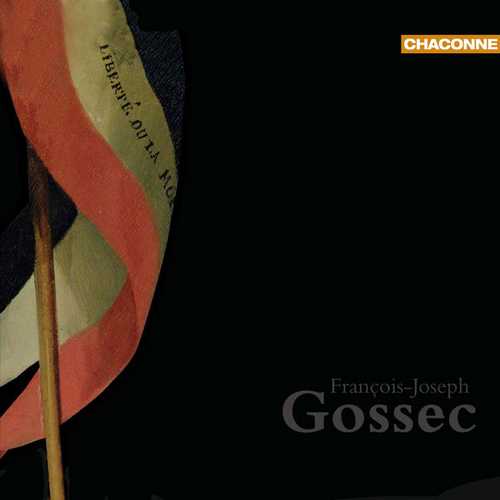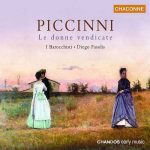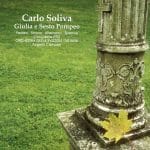
Composer: François-Joseph Gossec
Performer: Salomé Haller, Antonella Balducci, Guillemette Laurens, Makato Sakurada, Claudio Danuser, Philippe Huttenlocher, Arnaud Marzorati, Coro della Radio Svizzera, Coro Calicantus, I Barocchisti
Conductor: Diego Fasolis
Format: FLAC (tracks)
Label: Chandos
Catalogue: CHAN0727
Release: 2006
Size: 323 MB
Recovery: +3%
Scan: yes
Le Triomphe de la Republique ou Le Camp de Grand Pre
01. Overture: I. Allegro molto
02. Overture: II. Allegro moderato
03. Overture: III. March: Grave
04. Scene 1: God of the people and of kings (Chorus)
05. Scene 1: Taste, Republicans, the sweetness of the truce (Mayor)
06. Scene 1: Sun, passing overhead on your habitual course (Aide-de-Camp, Mayor, General)
07. Scene 2: Citizens, who with ardent courage … (Thomas, Laurette)
08. Scene 2: You gentle young ladies and all you young men (Thomas, Laurette, Chorus)
09. Scene 2: Village dance: The citizens of these shady groves (Thomas, Laurette, Old Man, Chorus)
10. Scene 3: The trumpet has sounded; you are called to arms (Aide-de-Camp)
11. Scene 3: Farewell our children and parents (Chorus of Youths, Women, Children, Old Men)
12. Scene 4: In our youth … (Old Man, Laurette, Mayor, Women, Children)
13. Scene 5: Let’s begin our celebrations (Chorus of Soldiers, Women, Old Men, Mayor, Officials)
14. Scene 5: Take up your songs, begin the dance again (General, Thomas)
15. Scene 5: And at last, on the ill-fated plains (General, Thomas, Aide-de-Camp)
16. Scene 5: Essential birthright of mankind (Chorus)
17. Scene 6: New Republicans whose voices entreat me (Goddess of Liberty)
18. Scene 6: Long live, long live Liberty! (Chorus)
19. Scene 6: Entry of people of various nations
20. Scene 6: The English, the Swiss etc
21. Scene 6: Dance: What of the intrepid fervour … (General, Chorus, Aide-de-Camp)
22. Scene 6: Pas de deux: Air for the Poles
23. Scene 6: Anglaise or Bostonienne
24. Scene 6: Air for the Swiss: Le Ranz des Vaches
25. Scene 6: Grivois
26. Scene 6: Valsque
27. Scene 6: Air for the Africans
28. Scene 6: Air for the Savoisiens
29. Scene 6: Vielle
30. Scene 6: Contredanse finale: Allegretto
After the events of 1789, François-Joseph Gossec (1734-1829) became an ardent musical icon of the revolution: Le Triomphe de la République (1793) is a single-act lyric divertissement, written to glorify the victory of the Republic’s army over anti-French troops led by the Duke of Brunswick at the battle of Valmy on September 20, 1792. In his informative essay, Carlo Piccardi explains that ’emerging from the houses of the aristocracy and the theatres into the wide-open public spaces, music was undergoing a radical change that was itself revolutionary’.
Diego Fasolis, the Swiss Radio Choir and the excellent I Barocchisti here provide a good account of Gossec’s fervent piece of propaganda.
The militant overture has sharp attack, bold brass and booming drums. The choruses ‘Dieu du peuple’ and ‘Malheur au despotisme’ bring to mind the kind of French revolutionary songs that Beethoven reflected in his symphonies. Salomé Haller and Makato Sakurada sing their solos with conviction and pleasing timbres (the latter’s ‘Les habitans’ is an elegantly orchestrated folk dance that seems like a curious compound between Gluck and Offenbach). There is little profound beauty or drama but Gossec’s music can be spectacularly vivid: the warlike ‘Dans le temps’ has cannon-fire drums and military trumpets woven into its fabric. The best moment is the concluding masque of internationally flavoured dances representing the English, Swiss, Poles, Spanish and Africans lining up to acknowledge how marvellous the French are. Playing with different orchestral styles and colours seems to free Gossec from the yoke of politics enough for him to show what he is really capable of.



